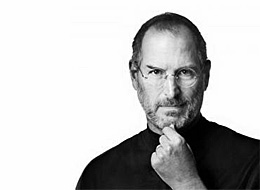Steve Jobs, a creative thinker and co-founder and longtime head of Apple, has passed away at the age of 56. The phenomenal success story of Steve Jobs has been second to none. The great visionary and the co-founder of Apple, was born on 24 February, 1995 in San Francisco to unwed college graduates Joanne Simpson and Abdul Fattah Jandali and was later adopted by Paul and Clara Jobs who eventually moved to Santa Clara county (now known as Silicon Valley) from south of the Bay Area and adopted a girl child Patti, in 1958.
Founding of Apple Computer
Jobs served as a video game designer with Atari in 1974 but subsequently left it and went to India where he travelled and experimented with psychedelic drugs and finally experienced spiritual enlightenment. At the age of 21, in the year 1976, Jobs associated with Steve Wozniak to establish Apple Computers, in his own family garage. The venture was funded with the sale of Jobs Volkswagen and Wozniak’s scientific calculation. Apple’s pioneering Macintosh computer launched in1984 with a now-iconic, Orwellian-themed Super Bowl ad.
Macintosh
Apple introduced the first commercially successful personal computer. It featured a graphical user interface and a mouse and was significantly promoted during the Super Bowl in 1984. The sales of Macintosh line stumbled around during the early 90’s but begin to gain the popularity again with iMac.
Success Outside Apple
Then came a 10-year hiatus during which he founded NeXT Computer, whose pricey, cube-shaped computer workstations never attracted consumers.
Subsequently buying Pixar Animations Studio from George Lucas proved to be more successful as the company made it big with “Toy Story”. Jobs brought the same marketing skill to Pixar that he became known for at Apple. His brief but emotional pitch for “Finding Nemo,” for example, was a masterful bit of succinct storytelling.
Return to Apple Computers
In 1996, Apple bought NeXT, returning Jobs to the then-struggling company he had co-founded. Within a year, he was running Apple again — older and wiser but no less of a perfectionist. And in 2001, he stepped up and introduced the intriguing iPod, the little white device that transformed portable music and catalyzed Apple’s furious comeback.
Fight with Cancer
In 2003, Jobs discovered he had a neuroendocrine tumor, a rare but operable form of pancreatic cancer. Instead of immediately opting for surgery, Jobs chose to alter his pescovegetarian diet while weighing Eastern treatment options. He postponed surgery for nine years, making board of directors nervous as they feared losing their shareholders. In 2004 he had a successful surgery to remove pancreatic tumor but hardly revealed anything about his health.
Resignation
Finally in August 2011 Jobs resigned as CEO of Apple, still remaining the chairman of the company’s board. Though it only resulted in 5% drop in the after-hour trading, which considering Jobs importance to Apple is quite small. Perhaps the speculation about Jobs health and his medical leave since January 2011 had prepared everyone for the day.
Jobs’ Legacy
Jobs’ road to success was complete in summer 2011, when Apple slated more cash reserves than the U.S. Treasury and even briefly surpassed Exxon Mobil as the world’s most valuable company.
